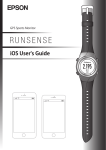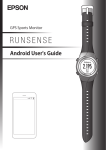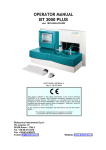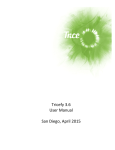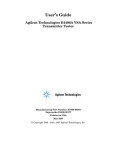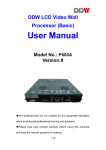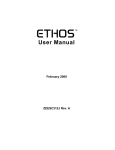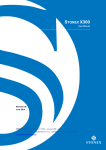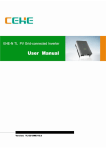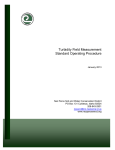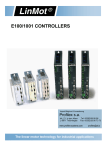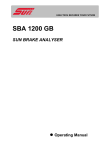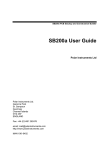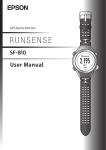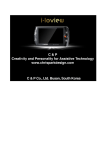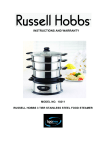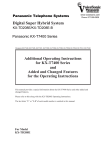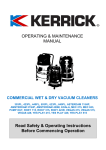Download USER`S MANUAL FLAME PHOTOMETER AFP 100
Transcript
BIOTECH ENGINEERING MANAGEMENT CO. LTD. (U.K) USER’S MANUAL FLAME PHOTOMETER AFP 100 APPLICABILITY This manual applies to instrument With Serial Number ________________ NOTE Keep with instrument 1 1.1 1.2 1.3 1.4 1.5 1.6 1.7 2 2.1 2.2 2.3 2.3.1 2.3.2 2.3.3 2.4 3 3.1 3.2 3.3 4 4.1 4.2 4.2.1 4.2.2 4.2.3 4.2.4 4.3 4.3.1 4.3.2 4.3.3 4.3.4 4.4 5 5.1 5.2 GENERAL INFORMATION 1-1 INTRODUCTION PRINCIPLE OF OPERATION SPECIFICATIONS INSTRUMENT AND MANUAL IDENTIFICATION ACCESSORIES RECOMMENDED SPARES SAFETY CONSIDERATIONS 1-1 1-1 1-1 1-1 1-1 1-2 1-2 INSTALLATION 2-1 INTRODUCTION INITIAL INSPECTION INSTALLATION REQUIREMENTS LOCATION PLACEMENT POWER REQUIREMENT REPACKING FOR SHIPMENT 2-1 2-1 2-1 2-1 2-1 2-2 2-3 INSTALLATION PROCEDURE 3-1 INTRODUCTION 3-1 INTERFACING OF COMPRESSOR UNIT & LPG CYLINDER 3-1 TO FPM UNIT POWER CONNECTIONS TO THE INSTRUMENT 3-1 OPERATION 4-1 INTRODUCTION DESCRIPTION GENERAL FUNCTION SAMPLE MEASUREMENT MENU MEASUREMENT/CALIBRATION MODES LAY OUT OF CONTROLS FRONT PANEL REAR PANEL R.H.S. PANEL L.H.S. PANEL PRE-OPERATING INSTRUCTIONS 4-1 4-1 4-1 4-1 4-2 4-4 4-4 4-4 4-5 4-5 4-6 4-6 OPERATION FLOW OF FPM UNIT 5-1 INITIALISATION FUNCTION SELECTION 5-1 5-1 5.3 5.4 5.4.1 5.4.2 5.4.3 5.4.4 5.4.5 5.4.6 5.4.7 5.4.8 5.4.9 5.5 5.6 5.7 5.8 5.9 OPERATION FLOW OF ‘READ’ FUNCTION SAMPLE MEASUREMENT STANDARDISATION CLEANING OPERATION OPERATION FLOW OF ‘BLANK’ MEASUREMENT OPERATION FLOW OF ‘SAMPLE’ MEASUREMENT OPERATION FLOW OF RE-STANDARDISATION OPERATION FLOW OF ‘VIEW’ MENU OPERATION FLOW OF ‘PRINT’ MENU OPERATION FLOW OF ‘SAVE’ MENU USER PARAMETER ENTRY OPERATION FLOW OF ‘CALIBRATE’ FUNCTION OPERATION FLOW OF ‘VIEW’ FUNCTION OPERATION FLOW OF ‘PRINT’ FUNCTION ERROR MESSAGES WARNING MESSAGES 5-2 5-6 5-6 5-8 5-9 5-9 5-10 5-11 5-11 5-13 5-14 5-16 5-20 5-22 5-24 5-25 6 PREVENTIVE MAINTENANCE 6,7-1 7 TROUBLE SHOOTING 6,7-1 ANNEXURES A B C D E1 E2 F G FLAME PHOTOMETRY PRINCIPLE OF OPERATION SPECIFICATIONS FLAME PHOTOMETER – AFP 100 LAYOUT OF CONTROLS PREPARATION OF STANDARD SOLUTIONS PREPARATION OF STANDARD SOLUTIONS INSTRUCTIONS FOR USE OF COMPRESSOR PREVENTIVE MAINTENANCE A-1 B-1 C-1 D-1 E1-1 E2-1 F-1 G-1 FLAMEPHOTOMETRY A.1 INTRODUCTION If a solution containing metallic salt (or some other metallic compound) is aspirated into a flame, a vapour which contains atoms of the metal may be formed. Some of these gaseous metal atoms may be raised to an energy level which is sufficiently high to permit the emission of radiation characteristic of that metal, e.g. the characteristic yellow colour imparted to flame by compounds of sodium. When a solution containing a suitable compound of the metal to be investigated is aspirated into a flame, the following events occur in rapid succession: i. evaporation of solvent leaving a solid residue, ii. vaporisation of the solid with dissociation into its constituent atoms, which initially, will be in the ground state, and iii. some atoms may be excited by the thermal energy of the flame to higher levels, and attain a condition in which they radiate energy. The resulting emission spectrum thus consists of lines originating from excited atoms or ions. These processes are conveniently represented diagrammatically as in fig-A.1. A.2 ELEMENTARY THEORY Consider the simplified energy level diagram shown in fig-A.2, where E0 represents the ground state in which the electrons of a given atom are at their lowest energy level and E1, E2, E3, etc., represent higher or excited energy levels. Transitions between two quantised energy levels, say from E0 to E1, correspond to the absorption of radiant energy, and the amount of energy absorbed (∆E) is determined by Bohr’s equation ∆E = E1 − E0 = hν = hc/λ where c h ν λ = = = = Velocity of light Plank’s constant Frequency Wavelength of the radiation absorbed Clearly, the transition from E1 to E0 corresponds to the emission of radiation of frequency ν. Since an atom of a given element gives rise to a definite, characteristic line spectrum, it follows that there are different excitation states associated with different elements. The consequent emission spectra involve not only transitions from excited states to the ground state, e.g., E3 to E0, E2 to E0 (indicated by full lines in fig-A.2), but also transitions such as E3 to E2, E3 to E1, etc., (indicated by the dotted lines). Thus it follows that the emission spectrum of a given element may be quite complex. In theory it is also possible for absorption of radiation by already excited states to occur, e.g., E1 to E2, E2 to E3, etc., but in practice the ratio of excited to ground state atoms is extremely small, and thus the absorption spectrum of a given element is usually only associated with transitions from the ground state to higher energy states and is consequently much simpler in character than the emission spectrum. The relationship between the ground state and excited state populations is given by the Boltzmann equation N1/N0 = (g1/g0) ∗ e −∆E/kT where N1 N0 g1/g0 ∆E k T = number of atoms in the excited state number of atoms in the ground state ratio of statistical weights for ground & excited states energy of excitation = hν the Boltzmann constant the Temperature in Kelvin It can be seen from this equation that the ratio N1/N0 is dependent upon both excitation energy ∆E and the temperature T. An increase in temperature and a decrease in ∆E (i.e., when dealing with transitions which occur at longer wavelengths) will both result in a higher value for ratio N1/N0. Calculation shows that only a small fraction of the atoms are excited, even when the temperature is high and the energy low. NOTE THIS THEORY ON FLAMEPHOTOMETRY IS MEANT ONLY AS AN INTRODUCTION TO THE SUBJECT. THIS IS NEITHER EXHAUSTIVE NOR COMPLETE. Reference : G.H.JEFFERY, J.BASSETT, J.MENDHAM and R.C.DENNEY ″Vogel’s Text book of Quantitative Chemical analysis″, 5th edition, LONGMAN SCIENTIFIC & TECHNICAL , LONGMANN GROUP UK LTD., HARLOW, 1989 Evaporation + − M X Solution + − MX Solid M X Mist Vaporization Thermal excitation Dissociation M(gas) + X(gas) M°(gas) hν Flame emission Fig-A.1 E3 E2 E1 E0 Fig-A.2 MX Gas Biotech Engineering Management Co. Ltd. (UK) FLAMEPHOTOMETER – AFP 100 SAILENT FEATURES • Microprocessor based with Printer interface • Four element measurement in single aspiration of the sample • Calibration curve programmability using maximum of 20 standards in the range of interest of the user • Data processing through optional curve fitting techniques - least squares, quadratic • Multiple calibration curves saving facility • Automatic Ignition • Automatic gas shut off in case of Flame extinguish. SPECIFICATIONS Sensitivity Element in ppm : : Na 0.5 K 0.5 Li 0.5 Ca 15 Range Element in ppm in mEq * : : : Na 1-100 0-200 K 1-100 0-100 Li 1-100 0-10 Ca 15-100 0-5 Linearity Element in % : : Na K Li Ca ----------------------- Better than 2% ----------------------- Reproducibility Element in % : : Na K Li Ca --------- 1% CV for 20 consecutive samples ---------- Flame System LPG & Oil-free dry air Detector Photodiode Date Presentation Readout Hard copy 2 line 24 character Dot matrix backlit LCD module Parallel Centronic Printer Power Requirement 90-260V, 47-63Hz, Max 65 VA Physical Dimensions Size (WxDxH) in mm Weight in kg 430 x 230 x 235(+100 1) Accessories supplied With instrument At extra cost Approx. 10 Filters for Na, K, Air Compressor with buffer tank and 5cc beakers. Filters for Ca & Li (optional), Printer * with appropriate dilution of 100/200 Chimney of flame chamber 1 Specifications subject to change due to continuous development APPLICATIONS To determine - Na & K content in soils, plant material, food & beverages - Ca in wine in Food & Agriculture - Na, K & Li electrolytes in serum - Na & K in body fluids (blood, urine, perspiration & saliva) in Pathological, Medical, Clinical & Bio-Medical investigations - Alkali & Alkali earth metals in Mining & Metallurgy - Alkali & Alkali earth metals in presence of each other or in any other material - Na, K & Ca nutrient solutions for cultivation of antibiotics in Pharmaceuticals - Na, K & Ca in natural, spring, river, sea, boiler feed, rinse and waste water in Pollution Monitoring & Control - Solubility, absorption and corrosion - Alkali & Alkali earth metals in pastes, Soda glass, Ceramic & Chemical industries - Na, K & Ca in cement and its raw materials in Research Laboratories & Industries PREPARATION OF STANDARD SOLUTIONS FOR AFP 100 FLAME PHOTOMETER (for chemical analysis) INTRODUCTION Flame Photometer measures the concentration of Sodium, Potassium, Calcium and Lithium in terms of the quantity of the element itself in solution. Standard solutions prepared from the salts of these metals must be made up to contain the concentrations required in terms of the quantity of the elements Na, K, Ca or Li. The following values are typical for standards of 1mg. Na/100mL, 1mg. K/100mL, 10mg. Ca/100mL, and 10mg. Li/100mL. QUANTITY OF SALTS REQUIRED 1000 ppm standard solution should have 1000mg of element in 1000mL salt solution of the element. Thus 250mL standard solution should be made up of a quantity of salt of the element in mg., equivalent to (250 x Molecular Wt. of salt/Atomic Wt. of element), to contain 250mg. of element. Eleme nt Na K Ca Li Atomic Wt of element 22.99 39.10 40.08 6.94 Salt Molecular Wt. of salt NaCl KCl CaCO3 Li2CO3 58.44 74.56 100.09 73.89 Quantity of salt in mg. required for preparation of 250mL of 1000ppm standard solution 635 477 624 1331 PREPARATION Sodium & Potassium Weigh accurately “Anal R” quality of NaCl & KCl and dissolve in exactly 250mL of double distilled water. Dilute it 1:100 to get 1mg. Na/100mL and 1mg. K/100mL, which are equivalent to 10ppm. Calcium Weigh accurately “Anal R” quality of CaCO3, dissolve in minimum quantity of 1:1 HCl and make it up exactly to 250mL with double distilled water. Dilute it 1:10 to get 10mg. Ca/100mL which is equivalent to 100ppm. Lithium Weigh accurately “Anal R” quality of Li2CO3, dissolve in minimum quantity of 1:1 HCl and make it up exactly to 250mL with double distilled water. Dilute it 1:10 to get 10mg. Li/100mL which is equivalent to 100ppm. PREPARATION OF STANDARD SOLUTIONS FOR AFP 100 FLAME PHOTOMETER (for bio-chemical analysis) E2.1 SODIUM & POTASSIUM IN SERUM E2.1.1 Stock Standard solution Weigh accurately 11.68 gram of “Anal R” quality of Sodium Chloride (NaCl) and transfer it into a 1litre volumetric flask through a funnel. Weigh accurately 0.746 gram “Anal R” quality of Potassium Chloride (KCl)and transfer it into the same volumetric flask through the same funnel. Add double distilled water to the flask, dissolve the crystals and make up the solution to the mark with double distilled water. This Stock Standard solution contains 200mEq/L of Sodium (Na) and 10 mEq/L Potassium (K). E2.1.2 Working Standard solutions This Stock Standard solution is diluted 1:100 with double distilled water (10mL of Stock Standard solution make up to 1Litre). This diluted Stock Standard solution is further diluted as below to obtain a series of Working Standard solutions of Na & K. Diluted Stock Standard solution in mL 100 110 120 130 140 150 160 E2.1.3 Double distilled water in mL 100 90 80 70 60 50 40 Concentration in mEq/L of Working Standard solution Na K 100 110 120 130 140 150 160 5.0 5.5 6.0 6.5 7.0 7.5 8.0 Pre-treatment of Sample – Serum Serum sample obtained for tests should be diluted to the same proportion as the Stock Standard solution 1:100 (0.1mL of serum make up to 10mL with double distilled water). E2.2 SODIUM & POTASSIUM IN URINE E2.2.1 Stock Standard solution Weigh accurately 11.68 gram of “Anal R” quality sodium chloride (NaCl) and transfer it into a 1 litre volumetric flask through a funnel. Weigh accurately 7.455 gram of “Anal R” quality of potassium chloride (K Cl) and transfer it into the same volumetric flask through the same funnel. Add double distilled water to the flask, dissolve the crystals and make up the solution to the mark with double distilled water. This stock standard solution contains 200 mEq/lL sodium (Na) 100 mEq/L potassium (K). E2.2.2 Working Standard solutions This Stock Standard solution is diluted 1:200 with double distilled water (5mL of Stock Standard solution make up to 1 Litre). This diluted Stock Standard solution is further diluted as below to obtain a series of Working Standard solutions of Na & K. E2.2.3 Diluted Stock Standard solution in mL Double distilled water in mL 100 110 120 130 140 150 160 100 90 80 70 60 50 40 Concentration in mEq/L of Working Standard solution Na 100 110 120 130 140 150 160 K 50 55 60 65 70 75 80 Pre-treatment of Sample – Urine Urine sample obtained for tests should be diluted to the same proportion as the Stock Standard solution 1:200 (0.5mL of urine made up to 100mL with double distilled water). E2.3 LITHIUM IN SERUM E2.3.1 Weigh accurately 0.925 gram of “Anal R” quality of Lithium Carbonate (Li2CO3) and dissolve it in minimum required quantity of dilute 1:1 HCl, transfer it into a 1 litre volumetric flask and make up the solution to the mark with double distilled water. This Stock Standard solution contains 25mEq/L of Lithium (Li). E2.3.2 Working Standard solutions This Stock Standard solution is diluted 1:5 with double distilled water (200mL of Stock Standard solution made up to 1Litre). This diluted Stock Standard solution is further diluted as below to obtain a series of Working Standard solutions of Li. E2.3.3 Diluted Stock Standard solution in mL Double distilled water in mL 100 80 60 50 40 30 20 10 5 0 20 40 50 60 70 80 90 95 Concentration in mEq/L of Working Standard solution Li 5.00 4.00 3.00 2.50 2.00 1.50 1.00 0.50 0.25 Pre-treatment of Sample – Serum Serum sample obtained for tests should be diluted to the same proportion as the Stock Standard solution 1:5 (1mL serum made up to 5mL with double distilled water). NOTE Single distilled water should not be used. It will give erroneous readings due to dissolved salts. Flame should be blue (luminous) with distilled water. It should not be coloured. INSTRUCTION FOR USE OF THE COMPRESSOR The compressor is an oil free diaphragm type unit with very sturdy and easily accessible construction. All working spares are provided with the unit to enable the user trouble-free service for a long time. Spares/accessories provided are : 1. 2. 3. 4. 5. Diaphragms Inlet/Outlet valves Inlet filters Fuse ‘O’ ring 7.65mm between T and outlet valves 2 Nos. 2 Nos. 6 Nos. 1 No. 2 Nos. MOTOR This is a 90W, 230V, single phase, 50Hz., AC motor in drip proof construction and is provided with a slow blow fuse, neon indicator, switch and mains cord with a moulded 3pin, 5A plug. Ensure that your power outlet has a working earth connection so that safe working is assured. The motor is coupled on to the pump by an eccentric cam and counter weight which is locked on to the shaft with Allen grub screws. PUMP This is a diaphragm type unit with a neoprene rubber diaphragm and neoprene valves. Access to the valves and diaphragm is as follows : 1. For access to the inlet valve, unscrew the air filter holder and the neoprene valve is now accessible. The valve can now be lifted out and the new one replaced. Screw the cover back on and hand tight only. Do not use any tools/wrench/spanner for tightening. The inlet filter is held in place by a circlip, which can be pried out when the filter element is to be replaced. 2. For access to the outlet valve, proceed as follows : i. ii. Loosen the nut which clamps the copper tube to the vertical buffer tank. On top of the pump head, on the outlet valve, is a brass T on which the copper tube is brazed. This T is held down on to the inlet valve assembly by a captive nut just below the T. Loosen this nut. iii. Gently pull out the T and copper tube and turn it away from the head. iv. Unscrew the top cover of the outlet valve assembly. Now the valve is accessible. To reassemble, reverse steps (iv) to (i) above. 3. For access to the diaphragm, proceed with steps 2(i), (ii) and (iii). Then as follows : i. ii. iii. Remove the six screws holding the pump head to the body and lift out head. The diaphragm is now visible. Unscrew the bolt in the center of the diaphragm and lift out along with the top and bottom packing pieces. Replace with new diaphragm and take care not to interchange the packing pieces or the way they are placed (top and bottom). NOTE Use only Diaphragms provided by us. Reverse steps (iii), (ii) and (i) and 2(i), (ii) for reassembly. BUFFER TANK This has an inlet through the copper tube from the outlet valve assembly which reaches nearly up to the bottom of the tank. The copper tube is secured by two ‘O’ rings and a hex nut. (Remove as in 2(i), (ii) and (iii) above). There is a bleed valve at the bottom of the tank which is used to continuously bleed the compressor to reduce load on the motor as well as to drain any moisture which accumulates in the tank. With the compressor running and connected to the Flame photometer, open the air valve of the latter fully, adjust bleed valve to give 11 to 12 psi on Flame photometer pressure gauge. Then adjust to required 10 psi by means of the Flame photometer air valve. The outlet nipple is towards the top of the tank. For normal operation, plug in the mains cord to a suitable earthed power outlet and switch on after connecting the outlet with the pressure tubing provided to the Flame photometer. For areas of excessive high humidity, we supply an accessory air filter/ moisture trap which can be connected in the compressed air line. Please contact us for details. LUBRICATION A few drops of SAE 13 (sewing machine oil) should be introduced into the oiling parts of the motor after approximately 20 hr. of running or once a month. PREVENTIVE MAINTENANCE G.1 GENERAL G.1.1 With instrument switched off, operate all switches and controls to ensure their smooth functioning and tighten the fixing screws of knobs, if necessary. G.1.2 Clean soot and dust accumulated on the external panels and covers with clean soft and dry cloth or brush. Use clean water for removing stubborn stains. G.1.3 Clean soot and dust accumulated on the internal surfaces, chimney and components with clean soft and dry cloth or brush. Moistened cotton swabs may be used for stubborn stains. Use lens cleaning fluid and tissues for cleaning optical windows, lenses and filters. NOTE 1. Ensure water does not enter (drip/splash) inside the instrument while cleaning. 2. Do not use Petrol, Acetone or Carbon Tetrachloride which will remove the corrosion resistive coating applied on the surfaces and components. 3. Do not use high velocity Air blowers. G.2 NEBULIZER G.2.1 The performance of our Flame photometer mainly depends on the condition of the Nebulizer. Nebulizer must be kept in absolutely clean condition. Flush Nebulizer with Blank followed by distilled water for 10 to 15 minutes daily, after use, to remove any solid matter remaining in the assembly. G.2.2 After every 100 tests or when the Nebulizer is blocked during tests, extinguish flame by cutting off fuel first and then air supply, open the hatch on the instrument, release the clamp and take out the Nebulizer. Remove from the capillary inlet nozzle and push out any obstruction or block in the Nebulizer and Capillary with the CLEANING WIRE provided. Allow high pressure air from the compressor to discharge through the inlet nozzle of the Nebulizer by closing the outlet nozzle. Re-fix the capillary to the inlet nozzle. Dip the inlet-end of the capillary in Distilled water. A fine spray/mist of Distilled water should emerge from the outlet of the Nebulizer. CAUTION Each Nebulizer is adjusted and tested for optimum performance. Adjustment is critical. Hence ensure pre-set adjustment of Nebulizer is not disturbed under any circumstances. G.3 MIXING CHAMBER After every 100 tests or when flame does not turn blue even after prolonged feeding of Distilled water or when Nebulizer is blocked during a test, extinguish flame by cutting off the fuel first and then air supply. Pull out the Burner and Nebulizer-End cap assembly. Flush warm water, from a long flexible spout of a polythene bottle, through top of mixing chamber for cleaning thoroughly wire mesh fixed underneath the burner at its mouth, the vanes of the baffle assembly and interior of the mixing chamber, in situ. Wash Burner and Nebulizer-End cap assembly separately outside. Reassemble the mixing chamber. Dip the inlet end of the capillary in distilled water. Supply air and allow distilled water to be sprayed in the mixing chamber for 10 to 15 minutes. G.4 GAS & AIR REGULATORS No preventive maintenance is recommended for the GAS & AIR Regulators. G.5 COMPRESSOR Read Instructions for use of the compressor (annexure-f) for preventive maintenance of the compressor. 1. GENERAL INFORMATION 1.1 INTRODUCTION The information contained in this manual is for installation and operation of BIOTECH ENGINEERING MANAGEMENT CO. LTD. (U.K) FLAME PHOTOMETER, AFP 100. This section of the manual covers Principle of operation, Specifications and other general information on the instrument. 1.2 PRINCIPLE OF OPERATION 1.2.1 FLAMEPHOTOMETER operates on the principle of FLAME PHOTOMETRY (also known as Flame Emission Spectroscopy - FES) A brief theory of FLAME PHOTOMETRY is given at the end of the manual Annexure - A 1.2.2 A sample diluted with distilled water is nebulized and aspirated into blue flame of LPG-Air mixer. The intensity of emission transmitted through filter for an element compared to that of blank with which the instrument is standardised, directly indicates concentration of the element in the sample. Annexure - B 1.3 SPECIFICATIONS Specifications of FLAME PHOTOMETER, AFP 100 are given at the end of the manual. Annexure - C 1.4 INSTRUMENT AND MANUAL IDENTIFICATION Instrument is identified by a serial number on the rear panel of the instrument. This manual applies to the instrument with serial number as indicated in the title page. 1.5 1.5.1 ACCESSORIES The following accessories are supplied with the instrument: 1.5.2 Air compressor with external buffer tank 10ml glass beakers Capillary Cleaning wire The following accessories are essential to operate the instrument : - LPG cylinder - Regulator - Pressure hose for LPG connection to the instrument NOTE Provision for these accessories has to be made by the user. 1.5.3 The following accessories/facilities are optional, supplied at extra cost - Li & Ca interference filters 1.5.4 The following accessories are required for availing the full potentiality of the Instrument: - Printer NOTE Provision for these accessories has to be made by the user. 1.6 RECOMMENDED SPARES The following are the recommended spares available at extra cost: FLAME PHOTOMETER UNIT 4AF/250V, Quick acting Glass Cartridge fuse of size 5 x 20 mm COMPRESSOR UNIT 1.7 500mAT, 250VAC Glass Cartridge fuse of size 5 x 20mm Rubber diaphragms Inlet/Outlet valves Inlet filters SAFETY CONSIDERATIONS The user’s manual should be read and safety precautions fully understood before using the instrument and compressor. WARNING All the necessary safety precautions meeting appropriate specifications for location of LPG cylinder and burner should be strictly followed. CAUTION ♦ ♦ ♦ ♦ ♦ ♦ ♦ To reduce risk of electrical fire or shock hazards. Do not expose this instrument to rain or excessive moisture High leakage current: To avoid electric shock, the power cord protective grounding connector connected to ground. For continued fire protection, replace only with 250V fuse of the specified type and rating. Do not remove cover, refer servicing to qualified personnel. In the event of power failure during operation of the instrument, to avoid flame hazards shut off the gas flow immediately by turning gas control to fully clockwise direction. Do not disconnect the gas tube from gas inlet when the cylinder regulator is in ‘ON’ position. Do not open the gas control to fully anticlockwise direction while igniting the flame. ♦ Do take care not to touch the flame chamber while igniting the flame to avoid injury to operator. 3. INSTALLATION PROCEDURE 3.1 INTRODUCTION This section of the manual deals with the interfacing details of COMPRESSOR and FPM Units, Pre-operating instructions and operating precautions. 3.2 INTERFACING OF COMPRESSOR UNIT & LPG CYLINDER TO FPM UNIT 3.2.1 Connect the pressure hoses (supplied along with the instrument) from Compressor unit and LPG Cylinder to FPM unit as shown in the table below. FROM TO AIR OUTLET nozzle of Compressor INLET nozzle of external Buffer tank OUTLET nozzle of external Buffer tank AIR INLET nozzle of FPM unit FUEL OUTLET nozzle of LPG FUEL INLET of FPM unit Cylinder regulator NOTE 1. Ensure that there is no leakage in Fuel & Air lines. 2. Check leakage using soap solution at all the nozzle ends of pressure hoses. 3. Drain the Buffer tank periodically by opening the thumbscrew on its drain nozzle. 3.2.2 Connect the PVC take-up capillary to the nebulizer inlet capillary. 3.2.3 Connect the PVC drainpipe to the overflow outlet of the condensate-collecting tank. 3.2.4 Attach the chimney to the top of the Flame chamber. Fix the Drain chamber to the instrument as shown in Annexure-D2. 3.3 POWER CONNECTIONS TO THE INSTRUMENT Connect the `socket end’ of the 3-pin power cord (supplied along with the instrument) to the socket labelled as `90-260V AC’ on the rear panel of the FPM unit and `plug end’ to the line filtered 3 contact AC power outlet. Connect the 3-pin power cord, attached to the Compressor, to the line filtered 3 contact AC power outlet. NOTE Ensure that the AC Power outlets are properly earthed 4. OPERATION 4.1 INTRODUCTION This section of the manual deals with the information and instructions for operation of AFP 100. 4.2 DESCRIPTION 4.2.1 General AFP 100 is a tabletop instrument with its components and modules inside and the controls on the panel etc., laid out for ease of operation and maintainability. The instrument consists of - Controls for regulating the pressure of Air & LPG and pressure gauge for reading the Air pressure. - Nebulizer and Mixing chamber for producing a fine mist of solution of the sample and mixing it with fuel. - Flame chamber and chimney for obtaining the flame emission characteristic of metallic salt under investigation. - Optics consisting lens system and motorised filter wheel for automatic selection of appropriate filter with peak transmission at the characteristic wavelength of the metallic salt under investigation. - Detector and signal processing electronics. - Microprocessor based control system for user interface. This stand-alone microprocessor based instrument is operable by soft touch keys on the control panel for self check & diagnostics, data acquisition, processing & presentation for viewing on LCD panel and for hard copy on a printer. Air at a given pressure is passed into a Nebulizer. The suction produced by it draws the solution of the sample into the Nebulizer, from where it emerges as a fine mist and passes into a mixing chamber. In the mixing chamber this fine mist of sample mixes evenly with the fuel gas stream at a given pressure, and the mixture burns at the tip of the burner. Radiation from the resulting flame passes through the lens system, and an optical filter which permits only the radiation characteristic of the element under investigation in the sample, to the photodetector. The output signal from the photodetector is processed to display concentration of the element in the units desired. 4.2.2 Function The various functions of the instrument are broadly classified into four main types viz. READ, CALIBRATE, VIEW and PRINT. ) 5.2 for operation flow. 4.2.2.1 READ FUNCTION This function is used to set the instrument operating parameters (calibration curve for standardisation of instrument, measurement mode and elements to be analysed,) required to measure the concentration of unknown samples. ) 5.3 for operation flow. 4.2.2.2 CALIBRATE FUNCTION This function is useful to generate a calibration curve in a user specified range of the total instrument’s concentration range. ) 5.5 for operation flow. The calibration curve generated can be saved into a file for later use of sample concentration estimation in the calibrated range. Battery backed up memory is allotted to save up to five such calibration files. These calibration files are identified by numbers 1 to 5. To generate a calibration curve, prepare number of standards having concentrations covering the interested concentration range uniformly and record the analytical signal (instrument’s response in mV). Enough number of standards must be measured to ensure that the calibration curve is well established since usually the analytical signal for the sample is found by interpolation between the analytical signals from the standards. 4.2.2.3 This data of standard concentration Vs signal (mV) can be fit into a calibration curve using either of the two available options viz., segmental linearisation or quadratic curve. VIEW FUNCTION This function is useful to view the contents of the saved files - either calibration or sample files on the LCD module. ) 5.6 for operation flow. 4.2.2.4 PRINT FUNCTION This function is useful to print the contents of the saved files - either calibration or sample files. ) 5.7 for operation flow. Another attractive feature of this function is that the user can set a string of 24 alphanumeric characters as HEADER which will be printed on all the printouts of the instrument. 4.2.3 Sample measurement menu Following the selection of either READ()5.3) or CALIBRATE()5.5) FUNCTION the instrument’s operation goes to sample measurement where the instrument is set to measure the concentration of unknown samples. ) 5.4 for operation flow. 4.2.3.1 4.2.3.1a 4.2.3.1b The description of the various items available in the menu is given below. SAMPLES MENU With this menu the instrument can be standardised (normalised), as per the options selected in READ function()5.3), to measure the concentration of unknown samples. ) 5.4 for operation flow. After standardisation the instrument is ready for concentration estimation of unknown samples. ) 5.4.4.1 for operation flow. OR the concentration of samples can be measured directly i.e. without any standardisation, following the calibration curve generation in CALIBRATE function()5.5). In this case the sample concentration is estimated based on the calibration curve generated currently. Online storing capacity of maximum 20 samples measurements is provided. 4.2.3.2 RAPID MENU With this menu the instrument can be set into a continuous measurement mode. In this mode the measured sample concentration is updated on the readout at a regular time interval and also these measurement can not be printed. The instrument is standardised (normalised), as per the options selected in READ function ()5.3), to measure the concentration of unknown samples in a continuous manner. After standardisation the instrument is ready for concentration estimation of unknown samples. ) 5.4.4.2 for operation flow. 4.2.3.3 VIEW MENU With this menu the sample measurements made in SAMPLES menu can be viewed on LCD module. ) 5.4.6 for operation flow. 4.2.3.4 PRINT MENU With this menu the sample measurements made in SAMPLES menu can be printed as a hard copy. ) 5.4.7 for operation flow. 4.2.3.5 NORM MENU With this menu the instrument can be re standardised (normalised), as per the options selected in READ function()5.3), in between the sample measurements if required. ) 5.4.5 for operation flow. 4.2.3.6 4.2.4 After completion of re standardisation the operation restores to the same point where the sample measurement is interrupted. SAVE MENU With this menu the sample measurements can be saved into a file for a latter use of print/view. ) 5.4.8 for operation flow. Battery backed up memory is allotted to save up to ten sample files each containing a maximum of twenty sample measurements. These sample files are identified by numbers 1 to 10. Measurement/Calibration modes The measurements are classified into three modes based on the unit of concentration and dilution factor as shown below MEASUREMENT/ UNIT OF CALIBRATION CONCENTRATION MODES Ppm GENERAL MEq SERUM MEq URINE DILUTION FACTOR 1 100 200 NOTE The standard solutions used for generating an ‘USER’ CALIBRATION CURVE should be prepared with appropriate dilution factor as shown in the table above. 4.3 LAYOUT OF CONTROLS Various function keys, controls, display etc., on the panels of FLAMEPHOTOMETER, AFP 100 are described as under Annexure - D 4.3.1 Front panel Readout & Key Board (1) 2 line, 24 character dot matrix backlit LCD module of 2.70 x 5.55 mm character size for readout. Alpha, Numeric, Sign/Combined with Function keys for data entry. FUNCTION KEYS MODES Press to resume the operation Ø Press to decrease value of a parameter. × Press to increase value of a parameter. ESC Press to escape from a current operational sequence and go back to the previous operation or another operation. Press to enable the instrument to accept/enter the data, parameter set or to go to the next ENTER operation. 4.3.2 z/NXT Press to select the next step (E.g. Next value of standard and its concentration etc.) or to enter the decimal point in the concentration value. +/YES Press to express the positive response to the prompts or to enter the positive sign. -/NO Press to express the negative response to the prompts or to enter the negative sign. Gas Control (2) Controls LPG pressure. Anti clock wise rotation increases the LPG pressure. Air Control (3) Controls AIR pressure. Anti clock wise rotation increases the AIR pressure. Pressure Indicator (4) Gauge indicating the AIR pressure Flow Status Indicators (22) Indicates Air, Gas & Flame 90-260VA (12) AC POWER INLET: Receptacle to take the 3 conductor power cord socket. FUSE (13) ON (14) FUSE HOLDER: Built in Fuse holder with 4AF/250V, Glass Cartridge Fuse of size 5x20mm inserted in it. POWER ON SWITCH: To switch the Instrument ON / OFF. Gas Inlet (15) Nozzle to accept GAS supply from LPG cylinder. Air Inlet (16) Nozzle to compressor. Rear panel accept AIR supply from 4.3.3 R.H.S. panel 4.3.3.1 MIXING CHAMBER Capillary (5) For drawing solution by suction Air Outlet (6) The pressure hose coming out of the FPM unit carries the Air supply to the Nebulizer. Drain chamber (7) Detachable tray to collect the condensate from mixing chamber. 4.3.3.2 4.3.4 Drain outlet (8) For draining out the condensate in the drain chamber. Platform (9) The extended platform provided is useful to keep the beaker, with sample solution, on it. FLAME CHAMBER (19) View port (10) For viewing the flame. When the knob on the view port is turned, ignitor can be inserted into the flame chamber for lighting the flame on the burner. Chimney (11) Detachable chimney for the flame chamber of the instrument. Nebulizer (20) To transport the solutions from beaker into the flame. Sample Beaker (21) Solutions to be stored in beaker for analysis PRINTER (17) PRINTER INTERFACE: To connect the printer. RS 232 C (18) RS 232C INTERFACE: To connect the PC. L.H.S. panel (Numbers in the brackets of controls etc., are as referred in Annexure - D) 4.4 PRE-OPERATING INSTRUCTIONS 4.4.1 ENSURE - 90-260V, 47-63Hz (As applicable), single phase power supply is available in the 3 contact 5A power outlets, used for this instrument, to power the FPM unit and Compressor unit. - Cartridge fuses of 4AF/250VAC ratings are in their places in the FPM unit and Compressor unit respectively. - Three pin plugs of the power cords of both the FPM unit and Compressor unit are properly inserted in the power outlets. - Chimney is properly installed on the flame chamber 4.4.2 Prepare and keep handy STANDARD (REFERENCE) SOLUTIONS NOTE Before proceeding with the operation of next step read the instructions for use of COMPRESSOR. 4.4.3 4.4.4 Annexure - F • Keep both AIR and GAS controls closed by turning clockwise to the maximum extent. • Switch the compressor ON and allow ten minutes for buffer tank filling. • Turn AIR control anti-clockwise to allow air into the mixing chamber. • Adjust AIR control to read 10psi (0.7kg/cm2) on the AIR pressure indicator • Allow five minutes for the air pressure stabilisation. • Ensure Air is flowing through the burner Prepare the sample in dissolved form of required dilution for the measurement and keep it handy. NOTE Ensure 1. All the glassware is ABSOLUTELY CLEAN. 2. Distilled water used (diluents) is TOTALLY CONTAMINATION FREE. This is essential for accurate results. 3. SAMPLE is neither highly viscous nor nonhomogeneous and contains no sediments. Filter if needed. 5. OPERATION FLOW 5.1 INITIALISATION • • • • Ensure 4.4.3 procedure is established Switch on the instrument. Release gas regulator by rotating quarter turn only anticlockwise. Release air, Air LED Green will glow when the pressure is >7 psi Adjust air regulator to 10 psi GAS LED Red will glow and buzzer gives alarm and after 3 seconds buzzer will stop. Ignition comes on automatically and ignites the flame. Flame LED yellow will glow. Adjust gas regulator to get silent flame on the tip with sharp blue cones of approximately 8 to 10 mm height. Never view the flame from the Top of the Chimney Do not touch the chimney extension when the Flame is on. Allow flame to stabilise for about 20 minutes. NOTE The duration of 20 minutes may vary depending on the ambient condition. Once the flame is stabilised, till it is put OFF, no further stabilisation time need to be allowed. In case of power failure, Gas automatically shuts off. In case of Flame extinguished, It will try to self ignite for one time, if Flame is not established, Gas automatically shuts off and gives alarm.. Repeat above procedure in case of power failure The following screens are sequentially displayed as the initialisation process is progressing. * BIOTECH AFP 100 * MODEL SCREEN FLAME PHOTOMETER VERSION x.x SOFTWARE VERSION Month yyyy SCREEN INITIALISATION SCREEN 5.2 FILTER HOME IN PROGRESS Please Wait …… FUNCTION SELECTION ‘FUNCTION SCREEN’ is displayed after completion of the initialisation process. 1. READ 2. CALIBRATE FUNCTION SCREEN 3. VIEW 4. PRINT ACTIVE KEYS : <1 to 4> 5.2.1 TO SELECT THE REQUIRED FUNCTION USE the active keys <1 to 4> to select the required function The appropriate screen prompting the action is displayed. )5.3 or 5.5 or 5.6 or 5.7 NOTE 1. At any point of time, the operation can be resumed to ‘FUNCTION SCREEN’ by pressing <MODE> key. 2. Pressing <ESC> key at any point of time takes the operation to the previous operation. 5.3 OPERATION FLOW OF ‘READ’ FUNCTION ) 5.2.1 to select this function. After selecting the FUNCTION ‘STD. CURVE OPTION SCREEN’ is displayed. STD. CURVE OPTION SCREEN Load Calibration Curve 1. BIOTECH 2. USER ACTIVE KEYS : <1,2> <ESC> to FUNCTION SCREEN 5.3.1 5.3.2 TO SELECT THE REQUIRED CURVE STANDARDISATION OF THE INSTRUMENT USE the active keys <1, 2> to select the required option. The appropriate screen prompting the action is displayed. OPTION FOR ) 5.3.2.1 or 5.3.3.1 CALIBRATION CURVE OPTION FOR STANDARDISATION By selecting this option the instrument can be standardised using the factory built calibration curves. )5.3.2.1 for operation flow. GENERAL MODE In this mode the measurement unit for sample concentration is ppm. Factory built calibration curves for estimating sample concentration of elements Na/K, Li and Ca in the full range of the instrument are provided. The instrument requires standardisation using two standard solutions, of the element under analysis, having 40ppm, 100ppm concentration and double distilled water for blank correction of the measurements. A mixed standard for Na and K should be used. ) annexure-E1 for preparation of standard solution procedure CLINICAL MODE (SERUM) In this mode the measurement unit for sample concentration is mEq. Factory built calibration curves for estimating sample concentration of elements Na/K and Li in the applicable range for clinical samples of SERUM are provided. The instrument requires standardisation using single standard solution, of the element under analysis, having appropriate concentration as shown in table below, and double distilled water for blank correction of the measurements. A mixed standard for Na and K should be used. ) annexure-E2 for preparation of standard solution procedure. Element under analysis Na/K Li CLINICAL MODE (URINE) Dilution factor 100 --- In this mode the measurement unit for sample concentration is mEq. Factory built calibration curves for estimating sample concentration of elements Na/K and Ca in the applicable range for clinical samples of URINE are provided. The instrument requires standardisation using single standard solution, of the element under analysis, having appropriate concentration as shown in table below, and double distilled water for blank correction of the measurements. A mixed standard for Na and K should be used. ) annexure-E2 for preparation of standard solution procedure. Element under analysis Na/K Ca 5.3.2.1 Standard solution concentra- tion for standardisation 160/8mEq 10mEq Standard solution concentra- tion for standardisation 160/80mEq 10mEq Dilution factor 200 --- Following the selection of ‘READ’ function ()5.2.1) and Calibration curve option () 5.3.1) the ‘MEASUREMENT MODE SCREEN’ is displayed. MEASUREMENT MODE SCREEN Select Measurement Mode 1.GEN. 2.SERUM 3.URINE ACTIVE KEYS : <1 to 3> <ESC> to STD. CURVE OPTION SCREEN 5.3.2.1.1 TO SELECT THE REQUIRED MEASUREMENT MODE USE the active keys <1 to 3> to select the required mode. The ‘ABOUT CAL. SCREEN’ is displayed showing the date on which the curve is generated. ABOUT CAL. SCREEN This is calibrated on .. dd-mm-year day ACTIVE KEYS : <ENTER> <ESC> to MEASUREMENT MODE SCREEN PRESS <ENTER> to confirm the selections so far made for a. Function (READ) b. Calibration curve to standardise the instrument c. Measurement mode (General/Serum/Urine) The ‘READ ELEMENTS’ SCREEN’ is displayed. READ ELEMENTS’ SCREEN Measure for Element(s) 1.Na/K 2.Li 3.Ca ACTIVE KEYS : <1 to 3> <ESC> to FUNCTION SCREEN 5.3.2.1.2 TO SELECT THE ELEMENT(S) TO BE ANALYSED USE the active keys <1 to 3> to select the required element(s). The ‘SAMPLE MENU SCREEN’ is displayed. SUMMARY : With operation 5.3.2.1 following operating parameters are set a. Element(s) to be analysed b. Measurement mode (General/Serum/Urine) c. Calibration curve to standardise the instrument The operation goes to SAMPLE MEASUREMENT () 5.4). NOTE In case the memory buffer is holding the last sample measurements ERROR MESSAGE-2 is displayed () 5.8.2). 5.3.3 ‘USER’ CALIBRATION CURVE OPTION FOR STANDARDISATION By selecting this option the instrument can be standardised with a calibration curve, which has been generated and stored by user. In this option the sample measurements are restricted to the elements/concentration range with which the calibration curve is generated. ) 5.3.3.1 for operation flow. 5.3.3.1 Following the selection of ‘READ’ function () 5.2.1) and ‘USER’ Calibration curve option () 5.3.1) the ‘CAL FILE SELECT SCREEN’ is displayed. CAL FILE SELECT SCREEN ENTER CAL FILE NUMBER * * (1-5) <ENT> ACTIVE KEYS : <1 to 5> <ESC> to STD. CURVE OPTION SCREEN 5.3.3.1.1 TO SELECT THE REQUIRED CALIBRATION FILE USE the active keys <1 to 5> to select a calibration file. The ‘ABOUT CAL. SCREEN’ is displayed showing the date on which the curve is generated. NOTE In case the file with selected number does not exist ERROR MESSAGE-1 is displayed () 5.8.1). ABOUT CAL. SCREEN This is calibrated on .. dd-mm-year day ACTIVE KEYS : <ENTER> <ESC> to CAL FILE SELECT SCREEN PRESS <ENTER> to confirm the selections so far made for a. Function (READ) b. Calibration curve file number to standardise the instrument SUMMARY : With operation 5.3.3.1 following operating parameters are set a. Element(s) to be analysed b. Calibration curve file number to standardise the instrument The operation goes to SAMPLE MEASUREMENT ()5.4). NOTE In case the memory buffer is holding the last sample measurements ERROR MESSAGE-2 is displayed ()5.8.2). 5.4 SAMPLE MEASUREMENT The instrument’s operation points to the ‘SAMPLE MENU SCREEN’ following the selection of either READ or CALIBRATE FUNCTIONS () 5.3 or 5.5). SAMPLE MENU SCREEN 1.SAMPLES 2.RAPID 3.VIEW 4.PRINT 5.NORM 6.SAVE ACTIVE KEYS : <1 to 6> <ESC> to QUIT SCREEN TO SELECT THE REQUIRED MENU OPTION USE the active keys <1 to 6> to select the required menu option. The appropriate screen prompting the action is displayed. For option <1, 2, 5> ) 5.4.1.1 or 5.4.1.2. For option <3> ) 5.4.6. For option <4> ) 5.4.7. For option <6> ) 5.4.8. QUIT SCREEN Quit Samples Mode? <YES/NO> ACTIVE KEYS : <YES>, <NO> <YES> OPTION The operation exits from the ‘SAMPLE MENU SCREEN ’ and the ‘FUNCTION SCREEN’ is displayed () 5.2). <NO> OPTION The operation remains at the ‘SAMPLE MENU SCREEN’. 5.4.1 Standardisation (Normalisation) Standardisation of the instrument is essential before the unknown samples are analysed. The standardisation process involves the emission intensity measurement of BLANK and STANDARD solutions. ) 5.4.3 for operation flow of BLANK measurement. The ‘STANDARD PROMPT SCREENs’ ()5.4.1.1.2) appropriate to the measurement mode (General/Serum/Urine) selected are displayed prompting for aspiration of necessary STANDARD solutions to standardise the instrument. Aspirate the STANDARD solution of the element(s) under analysis having concentration as prompted in ‘STANDARD PROMPT SCREENs’ and PRESS <ENTER> ‘WAIT SCREEN’ is displayed while the emission intensity of the STANDARD solutions for the selected element(s) is measured by the instrument. The measurement takes a total time of about (5sec/element + 7)seconds. The cleaning operation should be carried out as prompted by the ‘CLEAN PROMPT SCREENs 1&2’()5.4.2) following the emission intensity measurement. 5.4.1.1 STANDARDISATION USING ‘BIOTECH’ CALIBRATION CURVE By selecting the sample menu options 1 or 2 or 5 the instrument can be standardised for concentration estimation of unknown samples as per the options selected in operation 5.3.2 for element and measurement mode. ) 5.4.1.1.1 for operation flow. 5.4.1.1.1 The appropriate screens prompting for BLANK measurement()5.4.3) and CLEANING operation()5.4.2) are displayed in sequence as required for standardisation of the instrument. 5.4.1.1.2 After completion of BLANK measurement appropriate screens prompting for STANDARD measurement and CLEANING operation()5.4.2) are displayed in sequence as required for standardisation of the instrument. Various screens prompting for the required standard solution are shown below. STD. PROMPT SCREEN- Feed <Na/K/Li/Ca> ppm 1 for GENERAL measurement mode <40/40/ / > ACTIVE KEYS : <ENTER> <ESC> to BLANK FEED SCREEN STD. PROMPT SCREEN2 for GENERAL measurement mode Feed <Na/K/Li/Ca> ppm <100/100/ / > ACTIVE KEYS : <ENTER> <ESC> to STD. PROMPT SCREEN-1 STD. PROMPT SCREEN3 for SERUM (Na/K) measurement mode Feed <Na/K/Li/Ca> mEq <160/8.0/ / > ACTIVE KEYS : <ENTER> <ESC> to BLANK FEED SCREEN STD. PROMPT SCREEN4 for SERUM (Li) measurement mode Feed <Na/K/Li/Ca> mEq < / /10 / > ACTIVE KEYS : <ENTER> <ESC> to BLANK FEED SCREEN STD. PROMPT SCREEN5 for URINE(Na/K)measurement mode Feed <Na/K/Li/Ca> mEq <160/80/ / > ACTIVE KEYS : <ENTER> <ESC> to BLANK FEED SCREEN STD. PROMPT SCREEN6 for URINE (Ca) measurement mode Feed <Na/K/Li/Ca> mEq < / / /10 > ACTIVE KEYS : <ENTER> <ESC> to BLANK FEED SCREEN SUMMARY : 5.4.1.2 With operation 5.4.1.1 the instrument is standardised using BIOTECH calibration curve for the elements and measurement mode as selected in operation 5.3.2.1. The operation reverts to ‘SAMPLE MENU SCREEN’ and the instrument is ready for sample analysis ()5.4.4). STANDARDISATION USING ‘USER’ CALIBRATION CURVE By selecting the sample menu options 1 or 2 or 5 the instrument can be standardised for concentration estimation of unknown samples as per the options selected in operation 5.3.3 for element and measurement mode. )5.4.1.2.1 for operation flow. 5.4.1.2.1 The appropriate screens prompting for BLANK measurement()5.4.3) and CLEANING operation()5.4.2) are displayed in sequence as required for standardisation of the instrument. 5.4.1.2.2 After completion of BLANK measurement appropriate screens prompting for STANDARD measurement and CLEANING operation()5.4.2) are displayed in sequence as required for standardisation of the instrument. In this ‘standardisation curve option’ the choice of standards for standardising the instrument depends on the ‘curve fit option’ chosen during the calibration curve generation. In case of quadratic curve fit, the standard of highest concentration among the standards used for the calibration curve generation is used to standardise the instrument. In case of segmental curve fit, two standards among the standards used for the calibration curve generation are used to standardise the instrument. SUMMARY : 5.4.2 With operation 5.4.1.2 the instrument is standardised using USER calibration curve as selected in operation 5.3.3.1. The operation reverts to ‘SAMPLE MENU SCREEN’ and the instrument is ready for sample analysis ()5.4.4). Cleaning operation Cleaning operation following the emission intensity measurement (BLANK or STANDARD or SAMPLE) is essential to wash away the remnants of the last aspirated solution from the nubulizer and mixing chamber to avoid contamination of the next sample. Following any emission intensity measurement the ‘CLEAN PROMPT SCREEN1’ is displayed. CLEAN PROMPT SCREEN-1 Feed the Distilled Water to Clean ! <ENT> ACTIVE KEYS : <ENTER> 5.4.2.1 Aspirate the distilled water and PRESS <ENTER> ‘CLEAN PROMPT SCREEN-2’ is displayed while cleaning is in progress. CLEAN PROMPT SCREEN-2 Cleaning Nebuliser ! Please Wait ……. The operation goes to appropriate emission intensity measurement. 5.4.3 Operation flow of ‘BLANK’ measurement BLANK FEED SCREEN Feed the SBLANKT <ENT> ACTIVE KEYS : <ENTER> <ESC> to SAMPLE MENU SCREEN 5.4.3.1 Aspirate the BLANK solution and PRESS <ENTER> ‘WAIT SCREEN’ is displayed while the emission intensity of the BLANK solution for the selected element(s) is measured by the instrument. WAIT SCREEN El = Element being measured Please Wait ….. Reading ……. El The measurement takes a total time of about (5sec/element + 7)seconds. The operation, WHEN DIRECTED FROM ‘READ’ FUNCTION, goes to either 5.4.1.1.2 or 5.4.1.2.2 depending on the ‘standardisation curve option’ selected in operation 5.3.1. The operation, WHEN DIRECTED FROM ‘CALIBRATE’ FUNCTION, goes to 5.5.5.2. 5.4.4 Operation flow of ‘SAMPLE’ measurement The instrument’s operation points to the ‘SAMPLE MENU SCREEN’ following the completion of standardisation of instrument as per the operating parameters selected in operations either 5.3.2.1 or 5.3.3.1. SAMPLE MENU SCREEN 1.SAMPLES 2.RAPID 3.VIEW 4.PRINT 5.NORM 6.SAVE ACTIVE KEYS : <#> <ESC> to QUIT SCREEN 5.4.4.1 PRESS <1> to select the sample measurement. The ‘SAMPLE FEED SCREEN’ with sample number is displayed. SAMPLE FEED SCREEN Feed the sample : # <ENT> ACTIVE KEYS : <ENTER> <ESC> to SAMPLE MENU SCREEN 5.4.4.1.1 Aspirate the SAMPLE solution and PRESS <ENTER> ‘WAIT SCREEN’ is displayed while the emission intensity of the SAMPLE solution for the selected element(s) is measured by the instrument. The measurement takes a total time of about (5sec/element + 7)seconds. The cleaning operation should be carried out as prompted by the ‘CLEAN PROMPT SCREENs 1&2’()5.4.2) following the emission intensity measurement. The operation goes back to the ‘SAMPLE FEED SCREEN’ prompting for the next sample measurement. A memory buffer is provided to save a set of 20 sample measurements. After the measurement of 20 samples ERROR MESSAGE-3()5.8.3) is flashed indicating ‘memory full’ and the instrument operation goes back to ‘SAMPLE MENU SCREEN’()5.4.4). These sample measurements can be either viewed()5.4.6)/printed()5.4.7)/ saved()5.4.8) or cleared()5.9.2) from memory by pressing <0>. The sample measurement sequence can also be suspended (before completing the set i.e., 20 sample measurements) by pressing <ESC> to go to ‘SAMPLE MENU SCREEN’()5.4.4) at any ‘SAMPLE FEED SCREEN’ so that the measurements so far made can be either viewed()5.4.6) or printed()5.4.7) without clearing from memory buffer. However if SAVE option is selected at this instant the measurements so far made alone are saved and the memory buffer is cleared. The operation is resumed to operation 5.4.4 to enable the next set of sample measurements. The measurement sequence can be continued by selecting option 1 in ‘SAMPLE MENU SCREEN’()5.4.4). The sample numbering will continue from where the sequence is suspended. 5.4.4.2 PRESS <2> to select the continuous sample measurement. The ‘RAPID SAMPLE FEED SCREEN’ is displayed. RAPID SAMPLE FEED SCREEN Feed the sample !! <ENT> ACTIVE KEYS : <ENT> <ESC> to SAMPLE MENU SCREEN 5.4.4.2.1 Aspirate the SAMPLE solution and PRESS <ENTER> ‘WAIT SCREEN’ is displayed while the instrument measures the emission intensity of the SAMPLE solution for the selected element(s). The measurement takes a total time of about (5sec/element + 7)seconds. The measured sample concentration is updated on the readout as shown in the ‘RAPID VIEW SCREEN’. RAPID VIEW SCREEN uuu = Unit ; xxxx = Concentration Conc uuu Na xxxx Li xxxx Ca xxxx K xxxx <ESC> to SAMPLE MENU SCREEN 5.4.5 Operation flow of re-standardisation 5.4.5.1 5.4.6 PRESS <5> at ‘SAMPLE MENU SCREEN’()5.4.4) to re-standardise the instrument as per the operating parameters selected in operations either 5.3.2.1 or 5.3.3.1. The operation goes to BLANK measurement ()5.4.3). After completing the re-standardisation of instrument the operation reverts to ‘SAMPLE MENU SCREEN’ and the instrument is ready for sample analysis ()5.4.4). Operation flow of ‘VIEW’ menu 5.4.6.1 WHEN THE OPERATION IS DIRECTED FROM ‘READ’ FUNCTION PRESS <3> at ‘SAMPLE MENU SCREEN’()5.4.4) to view the sample measurements made in operation 5.4.4.1 on the readout of the instrument. The measured sample concentration is displayed on the readout as shown in the ‘CONC. VIEW SCREEN’. CONC. VIEW SCREEN xxxx = Concentration [Spl - ##] Na xxxx Li xxxx Ca xxxx K xxxx ACTIVE KEYS : <↓ /↑> <ESC> to SAMPLE MENU SCREEN 5.4.6.1.1 USE <↓ / ↑> to view the concentration of other samples available in the memory buffer. 5.4.6.2 WHEN THE OPERATION IS DIRECTED FROM ‘CALIBRATE’ FUNCTION PRESS <3> at ‘SAMPLE MENU SCREEN’()5.4.4) to view the concentration of either standards or samples on the readout of the instrument. The ‘VIEW OPTION SCREEN’ is displayed VIEW OPTION SCREEN * CONC OF * 1. SAMPLES 2. STANDARDS ACTIVE KEYS : <1, 2> <ESC> to SAMPLE MENU SCREEN USE the active keys <1, 2> to select the required option. The concentration values of either samples or standards are displayed on the readout as shown in the ‘CONC. VIEW SCREEN’. USE <↓ / ↑> to view the concentration of other samples/standards. 5.4.7 Operation flow of ‘PRINT’ menu 5.4.7.1 WHEN THE OPERATION IS DIRECTED FROM ‘READ’ FUNCTION PRESS <4> at ‘SAMPLE MENU SCREEN’()5.4.4) to print the sample measurements made in operation 5.4.4.1 on to a centronic parallel printer. The ‘PRINT MODE SCREEN-1’ is displayed. PRINT MODE SCREEN-1 * PRINT MODE * 1. SET HEADER 2. SAMPLES ACTIVE KEYS : <1, 2> <ESC> to SAMPLE MENU SCREEN USE the active keys <1, 2> to select the required option. The operation continues from 5.4.7.3. 5.4.7.2 WHEN THE OPERATION IS DIRECTED FROM ‘CALIBRATE’ FUNCTION PRESS <4> at ‘SAMPLE MENU SCREEN’()5.4.4) to print the concentration of either standards or samples on to a centronic parallel printer. The ‘PRINT MODE SCREEN-2’ is displayed PRINT MODE SCREEN-2 1. SET HEADER 2. SAMPLES 3. STANDARDS 4. BOTH 2&3 ACTIVE KEYS : <1, 2> <ESC> to SAMPLE MENU SCREEN USE the active keys <1 to 4> to select the required option. The operation continues from 5.4.7.3. 5.4.7.3 PRESS <1> to set the user parameter - organisation name. & 5.4.9 for entry of the user parameters. 5.4.7.4 PRESS <2> to print the concentration of samples available in the memory buffer. NOTE 1. In case the memory buffer is not holding any sample measurements ERROR MESSAGE-4 is flashed ()5.8.4). 2. If the printer is not connected or kept in off-line ERROR MESSAGE-5 is displayed ()5.8.5). 5.4.7.5 PRESS <3> to print the concentration of standards used for generating the calibration file. 5.4.7.6 PRESS <4> to print the concentration of both standards used for generating the calibration file and the samples available in the memory buffer. 5.4.7.7 The following screens are sequentially displayed prompting for the entry of various user parameters like Analyst name, Sample name. ) 5.4.9 for entry of the user parameters. ANALYST NAME SCREEN YOUR NAME : ABCabc# ACTIVE KEYS : <KEY> <ESC> to SAMPLE NAME SCREEN SAMPLE NAME SCREEN YOUR NAME : ABCabc# ACTIVE KEYS : <KEY> <ESC> to ANALYST NAME SCREEN DATE SCREEN ENTER DATE : DD-MM-YYYY <ENT> ACTIVE KEYS : <#> <ESC> to ANALYST NAME SCREEN TIME SCREEN Enter Time : HH:MM A/P <ENT> ACTIVE KEYS : <#, A, P> <ESC> to DATE SCREEN 5.4.7.8 The ‘PRINT WAIT SCREEN’ is displayed as the data is transferred to printer. After completing the printing job the instrument operation goes back to ‘SAMPLE MENU SCREEN’()5.4.4). 5.4.7.9 Whenever the information to be printed exceeds a page ‘SET PAGE SCREEN’ is displayed. PRESS <ENTER> after arranging the paper. SET PAGE SCREEN 5.4.8 Operation flow of ‘SAVE’ menu 5.4.8.1 FOR SAMPLES’ FILE SET NEXT PAGE TO PRINT SAMPLES <ENT> PRESS <6> at ‘SAMPLE MENU SCREEN’()5.4.4) to save the sample measurements made in operation 5.4.4.1. The ‘FILE NUMBER SCREEN-1’ is displayed. FILE NUMBER SCREEN-1 ENTER SAMPLE FILE NUMBER * * (1 - 10) <ENT> ACTIVE KEYS : <#> <ESC> to SAMPLE MENU SCREEN NOTE In case the memory buffer is not holding any sample measurements ERROR MESSAGE-4 is flashed ()5.8.4). 5.4.8.1.1 Enter an identification number (1 to 10) to the file to be saved. The operation continues from 5.4.8.3. NOTE If a file already exists with the identification number selected WARNING MESSAGE-3 is displayed ()5.9.3). 5.4.8.2 FOR CALIBRATION FILE The calibration data generated ()5.5) can be saved into a file by selecting <YES> option at operation 5.5.6. The ‘FILE NUMBER SCREEN-2’ is displayed. FILE NUMBER SCREEN-2 ENTER CAL FILE NUMBER * * (1 - 5) <ENT> ACTIVE KEYS : <1 to 5 > <ESC> to CURVE SAVE SCREEN 5.4.8.2.1 Enter an identification number (1 to 5) to the file to be saved. NOTE If a file already exists with the identification number selected WARNING MESSAGE-3 is displayed ()5.9.3). 5.4.8.3 The following screens are sequentially displayed prompting for the entry of various user parameters like Analyst name, Sample name. ) 5.4.9 for entry of the user parameters. DATE SCREEN ENTER DATE : DD-MM-YYYY <ENT> ACTIVE KEYS : <#> in case of samples’ file <ESC> to SAMPLE MENU SCREEN in case of calibration file <ESC> to FILE NUMBER SCREEN-2 TIME SCREEN Enter Time : HH:MM A/P <ENT> ACTIVE KEYS : <#, A, P> <ESC> to DATE SCREEN or Cancel Entry ANALYST NAME SCREEN YOUR NAME : ABCabc# ACTIVE KEYS : <KEY> <ESC> to SAMPLE NAME SCREEN SAMPLE NAME SCREEN YOUR NAME : ABCabc# ACTIVE KEYS : <KEY> <ESC> to ANALYST NAME SCREEN 5.4.8.4.1 After completing the saving job the instrument operation goes back to ‘SAMPLE MENU SCREEN’()5.4.4) in case of samples’ file (5.4.8.1). With the saving operation the memory buffer also gets cleared and the next set of sample measurement is enabled.. 5.4.8.4.2 After completing the saving job the instrument operation goes back to ‘CAL. VERIFY SCREEN’()5.5.6.1) in case of calibration file (5.4.8.2). 5.4.9 User parameter entry User parameters like Organisation name, Analyst name and Sample name can be entered through key board both for saving and printing purposes. The prompt screen to take the entry of user parameters is divided into three fields as shown below. FIELD ‘DATA ENTRY’ FIELD LOCATION First line on the readout USE Data entry ‘PARAMETER’ FIELD Left of second line on the readout Name of the parameter ‘CHARACTER’ FIELD Right of second line on the readout Select character USER PARAMETER PROMPT SCREEN DATA ENTRY PARAMETER ABCabc# ACTIVE KEYS : <KEY> 5.4.9.1 FUNCTIONING OF KEYS KEY NXT ENT ESC ↑ ↓ NO/YES+ 5.4.9.2 FUNCTION/CHARACTER To move the cursor in the ‘CHARACTER’ FIELD To accept the data in the ‘ENTRY’ FIELD Go back to the previous screen SPACE BACK SPACE + SELECTION OF CHARACTER The ‘CHARACTER’ FIELD has seven positions labelled as A B C a b c #. Selection of a character is done by placing the cursor in required position in ‘CHARACTER’ FIELD using <NXT> key and then pressing appropriate <#> key. As the characters are selected they appear in the ‘DATA ENTRY’ FIELD The possible set of characters is shown in the table below. 5.5 <#> KEY A 0 1 2 3 4 5 6 7 8 9 ∗ S V Y J M P A D G CURSOR POSITION IN ‘CHARACTER’ FIELD B C a b c # • s v y j m p a d g 0 1 2 3 4 5 6 7 8 9 < T W Z K N Q B E H > U X & L O R C F I ( t w z k n q b e h ) u x & l o r c f i OPERATION FLOW OF ‘CALIBRATE’ FUNCTION The following operating parameters need to be set before using this FUNCTION to generate a calibration curve. a. Mode where the unit of concentration and dilution factor are set ()5.5.1). b. Elements for calibration ()5.5.2). c. Type of curve fit ()5.5.3). d. Number of standards ()5.5.3.1 or 5.5.3.2). e. Concentration values of standards ()5.5.4). ) 5.2.1 to select this function. After selecting the FUNCTION ‘CAL. MODE SCREEN’ is displayed. CAL. MODE SCREEN Select Measurement Mode 1.GEN. 2.SERUM 3.URINE ACTIVE KEYS : <1 to 3> <ESC> to FUNCTION SCREEN NOTE In case the memory buffer is holding the last sample measurements ERROR MESSAGE-2 is displayed ()5.8.2). 5.5.1 TO SELECT THE REQUIRED CALIBRATION MODE USE the active keys <1 to 3> to select the required mode. The ‘CAL. ELEMENTS’ SCREEN’ is displayed. CAL. ELEMENTS’ SCREEN 1. Na 2.K 3. Li 4. Ca <#, ENT> ACTIVE KEYS : <1 to 4> <ESC> to CAL. MODE SCREEN 5.5.2 TO SELECT THE ELEMENT(S) FOR CALIBRATION USE the active keys <1 to 4> to select the required element(s) for calibration. A ) mark is put on the readout indicating the selection. PRESS <ENTER> to confirm the element(s) selection. The ‘CURVE FIT OPTION SCREEN’ is displayed. CURVE FIT OPTION SCREEN * CURVEFIT * 1.SEGMENTAL 2. QUADRATIC ACTIVE KEYS : <1, 2> <ESC> to CAL. ELEMENTS’ SCREEN 5.5.3 TO SELECT THE REQUIRED ‘CURVE FIT’ OPTION USE the active keys <1, 2> to select the required option. The appropriate screen prompting for the entry of number of standards is displayed. ) 5.5.3.1 or 5.5.3.2. 5.5.3.1 PRESS <1> to select the segmental curve fit option for calibration. The ‘STD. NUMBER SCREEN-1’ is displayed. STD. NUMBER SCREEN1 Enter no. of Standards (min: 2 max:20): 2 ACTIVE KEYS : <#>, <ENTER>, <ESC> <ESC> to CURVE FIT OPTION SCREEN PRESS <ENTER> to accept the entry or PRESS <ESC> to cancel the entry or USE numeric keys <#> to set the number of standards After setting the number of standards for calibration ‘STD. CONC. SCREEN’ is displayed. 5.5.3.2 PRESS <2> to select the quadratic curve fit option for calibration. The ‘STD. NUMBER SCREEN-2’ is displayed. STD. NUMBER SCREEN2 Enter no. of Standards (min: 3 max:20): 3 ACTIVE KEYS : <#>, <ENTER>, <ESC> <ESC> to CURVE FIT OPTION SCREEN PRESS <ENTER> to accept the entry or PRESS <ESC> to cancel the entry or USE numeric keys <#> to set the number of standards After setting the number of standards for calibration ‘STD. CONC. SCREEN’ is displayed. 5.5.4 TO ENTER THE STANDARDS’ CONCENTRATION VALUE STD. CONC. SCREEN [STD-##] Na Li Ca K ACTIVE KEYS : <#>, <ENTER>, <ESC> <ESC> to STD. NUMBER SCREENs USE numeric keys <#> to enter the concentration value of standards PRESS <ENTER> to accept the entry or PRESS <ESC> to cancel the entry if necessary The ‘STD. CONC. SCREEN’ is displayed as many times as the number of standards selected in operation 5.5.3.1 or 5.5.3.2 to accept the entry of concentration values for all the standards. After entering the concentration values of all standards ‘STD. CONFIRM SCREEN’ is displayed where the values entered can be reviewed or modified if required. STD. CONFIRM SCREEN Will you Verify Entered Concentrations ? <YES/NO> ACTIVE KEYS : <YES>, <NO> <YES> OPTION The ‘STD. CONC. SCREEN’ is displayed again showing the entered concentration values. STD. CONC. SCREEN xxxxx=Entered concentration value [STD-##] Na xxxxx K xxxxx Li xxxxx Ca xxxxx ACTIVE KEYS : <#>, <ENTER>, <ESC> <ESC> to STD. NUMBER SCREENs PRESS <ENTER> to accept the entry or PRESS <ESC> to cancel the entry or USE numeric keys <#> to enter the concentration value of standards <NO> OPTION IN CASE OF SEGMENTAL CURVE FIT OPTION the following screen is displayed prompting for the entry of second reference standard (middle of the standards’ concentration range selected for calibration) required during standardisation. Your Mid Range Ref ? Enter Std. No _ USE numeric keys <#> to set required standard PRESS <ESC> to cancel the entry or PRESS <ENTER> to accept the entry The operation goes to 5.5.5. IN CASE OF QUADRATIC CURVE FIT OPTION the operation goes to 5.5.5. SUMMARY : 5.5.5 With operations 5.5.1 to 5.5.4 the operating parameters - viz., mode, element(s), type of curve fit, number of standards and concentration values - needed to generate a calibration curve are set. The operation goes into measurement cycle ()5.5.5). Measurement cycle of curve generation The measurement cycle of curve generation involves the emission intensity measurement of BLANK and STANDARD solutions. A mathematical relation, between emission intensity concentration, is derived and applied to sample analysis. and Accuracy of the standards governs the accuracy of sample analysis. standard 5.5.5.1 The appropriate screens prompting for BLANK measurement ()5.4.3) and CLEANING operation()5.4.2) are displayed in sequence as required for measurement cycle of the instrument. 5.5.5.2 After completion of BLANK measurement ‘STD. FEED SCREEN’ prompting for STANDARD measurement and CLEANING operation()5.4.2) are displayed in sequence as required for measurement cycle of the instrument. STD. FEED SCREEN Feed the STD : # solution <ENT> ACTIVE KEYS : <ENTER>, <ESC> <ESC> to BLANK FEED SCREEN Aspirate the STANDARD solution and PRESS <ENTER> ‘WAIT SCREEN’ is displayed while the emission intensity of the STANDARD solution for the selected element(s) is measured by the instrument. The measurement takes a total time of about (5sec/element + 7)seconds. The cleaning operation should be carried out as prompted by the ‘CLEAN PROMPT SCREENs 1&2’()5.4.2) following the emission intensity measurement. The operation goes back to the ‘STD. FEED SCREEN’ prompting for the next standard measurement till all the standards are measured. During this measurement sequence of standards the standards already measured can be deleted if required by pressing <ESC> at any ‘STD. FEED SCREEN’ prompt except the first. 5.5.6 Following the completion of emission intensity measurement of all the standards the ‘CURVE SAVE SCREEN’ prompting for storing of the calibration curve generated. CURVE SAVE SCREEN Save this Curve ? <YES/NO> ACTIVE KEYS : <YES>, <NO> <YES> OPTION The operation goes to 5.4.8.2. 5.5.6.1 <NO> OPTION The ‘CAL. VERIFY SCREEN’ is displayed prompting for ‘Calibration Verification Table’ printout where the quality of curve fit can be analysed. CAL. VERIFY SCREEN Print Your Calibration Verification Table ? ACTIVE KEYS : <YES>, <NO> 5.5.6.1.1 <YES> OPTION The ‘Calibration Verification Table’ is printed. NOTE If the printer is not connected or kept in off-line ERROR MESSAGE-5 is displayed ()5.8.5). The ‘PRINT WAIT SCREEN’ is displayed as the data is transferred to printer. After completing the printing job the instrument operation goes back to ‘SAMPLE MENU SCREEN’()5.4.4). 5.5.6.1.2 <NO> OPTION The operation goes to ‘SAMPLE MENU SCREEN’ and the instrument is ready for sample analysis ()5.4.4). 5.6 OPERATION FLOW OF ‘VIEW’ FUNCTION ) 5.2.1 to select this function. After selecting the FUNCTION ‘VIEW FILE SCREEN’ is displayed. VIEW FILE SCREEN * VIEW * 1. CAL. FILE 2. SAMPLES FILE ACTIVE KEYS : <1,2> <ESC> to FUNCTION SCREEN 5.6.1 PRESS <1> to view the saved calibration files on the readout of the instrument The ‘CAL FILE SELECT SCREEN’ is displayed. CAL FILE SELECT SCREEN ENTER CAL FILE NUMBER * * (1 - 5) <ENT> ACTIVE KEYS : <1 to 5 > <ESC> to VIEW FILE SCREEN 5.6.1.1 USE the active keys <1 to 5> to select a calibration file to be viewed. The ‘ABOUT CAL. SCREEN’ is displayed showing the date on which the curve is generated. NOTE In case the file with selected number does not exist ERROR MESSAGE-1 is displayed ()5.8.1). ABOUT CAL. SCREEN This is calibrated on .. dd-mm-year day ACTIVE KEYS : <ENTER> <ESC> to VIEW FILE SCREEN PRESS <ENTER>. The ‘STD. CONC. SCREEN’ is displayed showing the entered concentration values of the standards. STD. CONC. SCREEN xxxxx=Entered concentration value [STD-##] Na xxxxx K xxxxx Li xxxxx Ca xxxxx ACTIVE KEYS : <↓ /↑> <ESC> to VIEW FILE SCREEN 5.6.1.2 USE <↓ / ↑> to view the concentration of other standards available in the file. 5.6.2 PRESS <2> to view the saved samples file on the readout of the instrument The ‘SAMPLE FILE SELECT SCREEN’ is displayed. SAMPLE FILE SELECT SCREEN ENTER SAMPLE FILE NUMBER * * (1 - 10) <ENT> ACTIVE KEYS : <# > <ESC> to VIEW FILE SCREEN 5.6.2.1 USE the numeric keys <#> to select a sample file to be viewed. The ‘ABOUT CAL. SCREEN’ is displayed showing the date on which the samples data is saved. NOTE In case the file with selected number does not exist ERROR MESSAGE-1 is displayed ()5.8.1). ABOUT FILE SCREEN This File is Saved on .. dd-mm-year day ACTIVE KEYS : <ENTER> <ESC> to VIEW FILE SCREEN PRESS <ENTER>. The ‘SPL. CONC. SCREEN’ is displayed showing the measured concentration values of the samples. SPL. CONC. SCREEN xxxx= concentration value [Spl-##] Na xxxx K xxxx Li xxxx Ca xxxx ACTIVE KEYS : <↓ /↑> <ESC> to VIEW FILE SCREEN 5.6.2.2 USE <↓ / ↑> to view the concentration of other samples available in the file. 5.7 OPERATION FLOW OF ‘PRINT’ FUNCTION ) 5.2.1 to select this function. After selecting the FUNCTION ‘PRINT FILE SCREEN’ is displayed. PRINT FILE SCREEN * PRINT * 1. SET HEADER 2.CAL FILE 3. SAMPLE FILE ACTIVE KEYS : <1 to 3> <ESC> to FUNCTION SCREEN 5.7.1 PRESS <1> to set the user parameter - organisation name. ) 5.4.9 for entry of the user parameters. 5.7.2 PRESS <2> to print the information of the calibration file. The ‘CAL FILE SELECT SCREEN’ is displayed. CAL FILE SELECT SCREEN ENTER CAL FILE NUMBER * * (1 - 5) <ENT> ACTIVE KEYS : <1 to 5 > <ESC> to PRINT FILE SCREEN 5.7.2.1 USE the active keys <1 to 5> to select a calibration file to be printed. The ‘ABOUT CAL. SCREEN’ is displayed showing the date on which the curve is generated. NOTE In case the file with selected number does not exist ERROR MESSAGE-1 is displayed ()5.8.1). ABOUT CAL. SCREEN This is calibrated on .. dd-mm-year day ACTIVE KEYS : <ENTER> <ESC> to PRINT FILE SCREEN NOTE If the printer is not connected or kept in off-line ERROR MESSAGE-5 is displayed ()5.8.5). 5.7.2.2 PRESS <ENTER>. The ‘PRINT OPTION SCREEN’ is displayed PRINT OPTION SCREEN * PRINT * 1. FULL REPORT 2. STANDARDS ONLY ACTIVE KEYS : <1, 2> <ESC> to PRINT FILE SCREEN USE the active keys <1, 2> to select the required option. 5.7.2.2.1 PRESS <1> to print the emission intensity recordings of the standards used for curve generation along with the slope. 5.7.2.2.2 PRESS <2> to print the concentration values of the standards used for curve generation. The ‘PRINT WAIT SCREEN’ is displayed as the data is transferred to printer. After completing the printing job the instrument operation goes back to ‘PRINT FILE SCREEN’ ()5.7). 5.7.3 PRESS <3> to print the saved samples file. The ‘SAMPLE FILE SELECT SCREEN’ is displayed. SAMPLE FILE SELECT SCREEN ENTER SAMPLE FILE NUMBER * * (1 - 10) <ENT> ACTIVE KEYS : <# > <ESC> to PRINT FILE SCREEN USE the active keys <#> to select a sample file to be printed. 5.7.3.1 NOTE 1. In case the file with selected number does not exist ERROR MESSAGE-1 is displayed ()5.8.1). 2. If the printer is not connected or kept in off-line ERROR MESSAGE-5 is displayed ()5.8.5). After printing the samples’ data ‘PRINT STCS. OPTION SCREEN’ is displayed . PRINT STCS. OPTION SCREEN PRINT STATISTICS ? <YES/NO> <YES> OPTION After printing the statistics data also the instrument operation goes back to ‘PRINT FILE SCREEN’ ()5.7). <NO> OPTION Without printing the statistics data the instrument operation goes back to ‘PRINT FILE SCREEN’()5.7). 5.9 5.9.1 WARNING MESSAGES WARNING MESSAGE-1 EARLIER SAMPLES WILL BE LOST ! OK ? <YES/NO> <YES> OPTION The operation goes to 5.4.4. <NO> OPTION ERROR MESSAGE-2 is displayed ()5.8.2). 5.9.2 WARNING MESSAGE-2 SAMPLE BUFFER WILL BE CLEARED! CONFIRM!! <YES/NO> <YES> OPTION The operation goes to 5.4.4 after clearing the memory buffer and the next set of sample measurement is enabled. <NO> OPTION The operation goes to 5.4.4 without clearing the memory buffer. 5.9.3 WARNING MESSAGE-3 OVERWRITE THE EXISTING FILE ? <YES/NO> <YES> OPTION The operation goes to 5.4.8.3 accepting the file identification number entered in operation 5.4.8.2. <NO> OPTION The operation goes to 5.4.4 without saving in case of samples’ file (5.4.8.1). The operation goes to WARNING MESSAGE-3 again without saving in case of calibration file (5.4.8.2). 6. PREVENTIVE MAINTENANCE Periodic preventive maintenance is recommended to ensure proper functioning and minimum down time of the instrument. Annexure - G 7. TROUBLE SHOOTING INDICATION 7.1 AIR 7.1.1 Compressor not running POSSIBLE FAULT a. b. 7.1.2 Air pressure not building a. up b. 7.1.3 No suction of solution a. through the nebulizer b. REMEDY Compressor getting power not a. Check power cable & proper insertion of plug of power cord in power outlet Fuse blew OFF b Replace fuse . Obstruction in Air hose Blockage of Air inlet of compressor a. Clear the obstruction/ Replace Air hose b Clear the blockage . Nebulizer capillary a. Clean the nebulizer might have been with cleaning wire blocked with solid particles No air supply b Clean the capillary . with cleaning wire 7.2 FLAME 7.2.1 Flame not getting ignited a. b. c. d. Regulator at LPG cylinder not in ON position or jammed LPG cylinder empty Obstruction in fuel hose a. Turn it to ON position or replace b . c Pressure may < 7 d psi . Replace Clear the obstruction/ Replace fuel hose Adjust pressure to 10 psi 7.2.2 Cones away from the a. burner and flame jumping Less of fuel flow a. Increase LPG flow 7.2.3 Undefined blue cones & a. large flame turning yellowish Air pressure low, more of fuel flow a. Increase Air pressure & reduce LPG flow 7.2.4 Flame making noise a. Air pressure high or a. Lower the Air less of fuel flow pressure to specified value. 7.2.5 Even after sustained a. cleaning with distilled water flame colour is not completely blue Impurities in the a. Check quality of distilled water distilled water (blank) (blank) Replace NOTE For any other fault return the instrument to your nearest Sales and Support centre. Biotech Engineering Management Co. Ltd. (UK)



















































